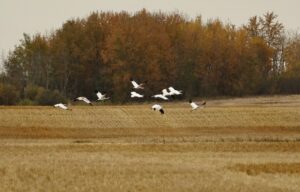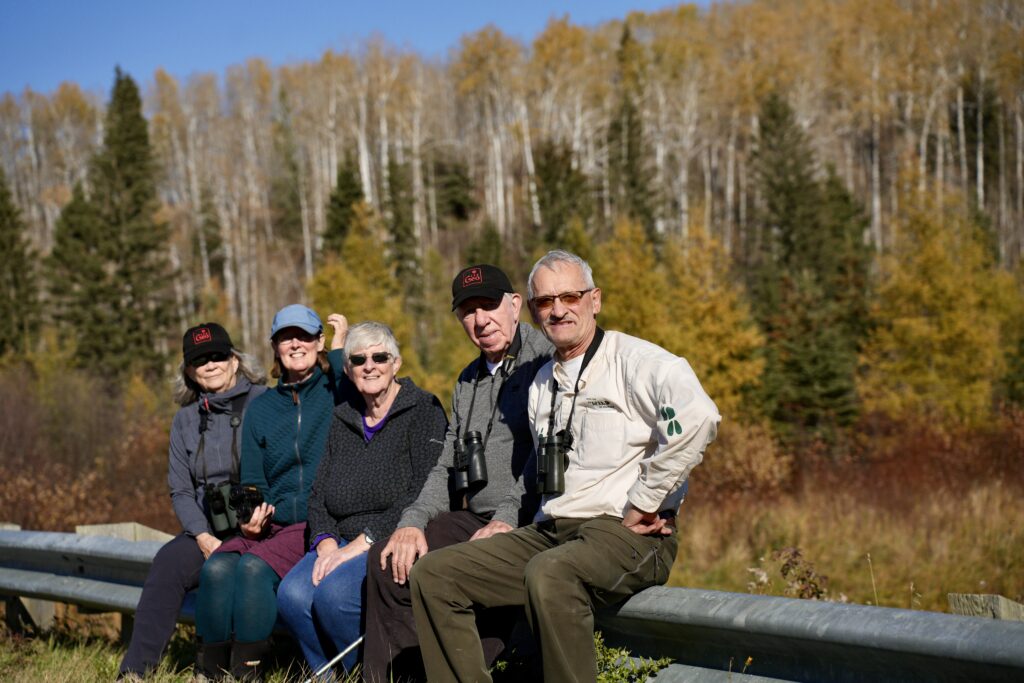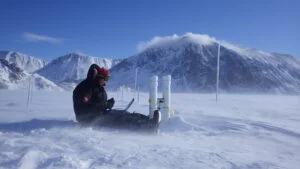
Travel
A Saskatchewan road trip in search of whooping cranes
In the mid-20th century, the elusive birds numbered in the dozens. Thanks to decades of conservation efforts, they appear to be making a comeback.
- 1444 words
- 6 minutes
Travel
RCGS Travel Ambassador Carol Patterson recounts her experience observing these legendary birds on a Canadian Geographic Adventure

Dawn was creeping over Prince Albert National Park when I stopped to watch a muskrat emerge from Waskesiu Lake. After four days of scanning the skies on Eagle-Eye Tours Saskatchewan Whooping Crane trip, it felt weird to be looking down. I watched the small rodent probe the shoreline, wet fur glistening as small brown eyes peered back at me as I snapped pictures to share with the other people on the tour.

As a Royal Canadian Geographical Society (RCGS) Travel Ambassador, I help people see the beauty in the land we call Canada. And adventure, for me, isn’t measured in the number of miles travelled but in the depths of awareness gained.
I enjoyed this trip for the opportunity to witness the whooping cranes returning from Wood Buffalo National Park, some with their young of the year. I marvelled at the changing skies of Saskatchewan, often the vivid oranges and pinks of a prairie sunset made me pause, but it was the clouds of feathers as ducks, geese, and cranes lifted off stubble fields and pothole lakes in numbers so numerous, they blocked out the sky at times, that gave me goosebumps.
The urge to travel and explore is strong within the human condition. We might think we must journey “away” to enjoy a holiday, and sometimes we do. But other times, a simpler exploration, digging deeply into landscapes and cultures that we think we know, reveals the best sights.

I grew up in Saskatchewan when whooping cranes were fighting back from extinction, and I wasn’t a birdwatcher. But, returning with Eagle-Eye Tours as a bird-loving RCGS Travel Ambassador, I marvelled at the conservation successes that allowed us to find these rare birds reliably.
My favourite memory from the trip is of a gruff farmer driving a large truck who slowed down for our group, standing in the middle of a gravel road, excitedly watching a flock of whooping cranes through a scope. Rather than scolding us for blocking traffic, he invited us into his backyard for a better view! He explained how he’s been providing quiet sanctuary for many years as the birds stop to rest and feed before flying south to Texas. It’s moments like this that make travel special, and companies like Eagle-Eye Tours craft itineraries that allow these unexpected discoveries.
I enjoyed sharing these experiences with other nature lovers on the Royal Canadian Geographical Society branded trip and look forward to doing it again in October 2023.
Join Carol Patterson in 2023 on the next Saskatchewan Whooping Cranes adventure.
Travel with us
Saskatchewan Whooping Cranes
In October, sandhill cranes migrate by the thousands south across southern Saskatchewan, stopping at various localities to refuel before continuing their journey. With them are a handful of whooping cranes, coming south from breeding grounds in Wood Buffalo National Park in the Northwest Territories.
We have a good chance of finding whooping cranes on our birding tour as there is a fine network of field observers scouting the area for these legendary birds. Along with cranes, tens of thousands of snow geese and Canada geese, with lesser numbers of Ross’s, greater white-fronted and cackling geese, are pouring through, as well as other waterfowl, shorebirds, raptors and passerines, especially large flocks of lapland longspurs with snow buntings and possibly northern shrikes.
Are you passionate about Canadian geography?
You can support Canadian Geographic in 3 ways:

Travel
In the mid-20th century, the elusive birds numbered in the dozens. Thanks to decades of conservation efforts, they appear to be making a comeback.

Science & Tech
Celebrating Canadian Innovation Week 2023 by spotlighting the people and organizations designing a better future

People & Culture
Award recipients honoured in the first virtual Annual General Meeting and Fellows Show.

Travel
Brewed with water and natural ingredients, Corona wants to encourage Canadians to responsibly experience the country’s natural wonders